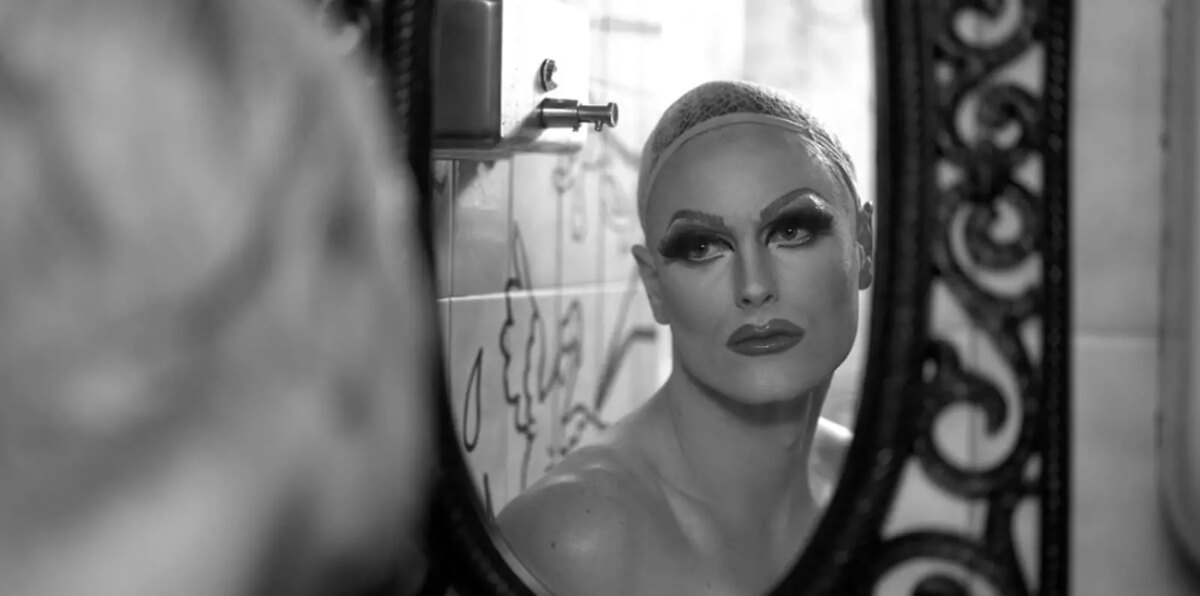
Any real friendship is a two-way street, but the unpleasant truth is that not all friendships are built to last. In Chrissy Judy, writer-director-star Todd Flaherty observes the collapse of a queer friendship and the frightening, isolating path one must take to discover who they truly are.
Judy (Flaherty) and Chrissy (Wyatt Fenner) are gay best friends living in New York City. They enjoy performing in local drag queen shows, hoping one day to make it big. Judy is more animated and carefree, first seen conspicuously stealing a makeup stick to get the attention of Chrissy, who works at the cosmetics store. It’s a perfect introduction to the characters and their playful dynamic. What follows is an upbeat montage of them leaving the store and making their way to a ferry. Sitting patiently as the world moves around them, Judy lays his head on Chrissy’s shoulder. Their bond is strong, at least for now, but not everything stays the same, nor should it.
Chrissy no longer has the drive to perform. He wants financial stability and wants to see the world. So, Chrissy informs Judy that he’s moving to Philadelphia with his boyfriend. Judy, however, is unable to respect his friend’s wishes. His inability to accept Chrissy’s decision harms their friendship. Judy is a hotheaded and loquacious drag queen. He regularly lashes out and stifles his feelings with alcohol and meaningless hookups. After Chrissy’s departure, Judy begins performing as a solo act and has trouble paying rent.
Flaherty and Fenner both give sublime performances throughout Chrissy Judy. Fenner plays it calmer than his fiery other half and sensibly communicates to Judy and audiences alike the reasoning behind his decision. However, Judy just can’t or won’t accept it. Whilst Judy is occasionally cruel and self-obsessed, Flaherty excellently plays and writes the character with a sympathetic edge. Judy must learn the hard way to balance his priorities, and while observing him do so is not always pleasant, his arc is emotionally satisfying because Flaherty really commits to the roles of actor, editor, writer, and director.
“…Chrissy informs Judy that he’s moving to Philadelphia…”
Despite being closed off, Flaherty devises it so Judy, when dressed in drag and performing for an audience, his emotions are momentarily unmasked for all to see. Whenever he sings, it’s as though the audience isn’t in the room; the camera lingers as he sings classic tunes like “After You’ve Gone,” the 1918 song composed by Turner Layton with lyrics by Henry Creamer. With that said, during one pivotal performance, Flaherty regularly cuts to Fenner’s reaction. It is one of many examples of Flaherty knowing how to develop the pair’s platonic relationship with telling glances and slight grimaces.
Aesthetically, Chrissy Judy employs black-and-white photography. Shooting in B&W is always risky because such a decision can come across as a gimmick. In this instance, the monochrome aesthetic signifies the shifting dynamics at work. It goes with the characterization of Judy as a reticent, self-destructive protagonist who’s hesitant to show any vulnerability.
The film never feels mishandled in the hands of Flaherty. Sure, the script could have used a once-over, particularly when it comes to a few altercations that feel stagy. But, for the most part, the conflict between Judy and Chrissy is not far-fetched. Flaherty validates their connection through the exchange of glances and how they completely submerge themselves into the serenity of the moment. But priorities shift, and people change.
In a role reversal of one of the first shots, the final one features Chrissy laying his head on Judy’s shoulder, and every emotion hits you like a ton of bricks. Chrissy Judy is a heartfelt, visually pleasing, and bittersweet take on friendship and drag. It will surely stir feelings within you regarding the friends you had to let go of for one reason or another.














